Separation of TFR’s infrastructure, operator functions may open way for big third-party ramp-up
State-owned freight logistics group Transnet aims to launch a dedicated infrastructure manager function within Transnet Freight Rail (TFR) by October, effectively separating the infrastructure and operational aspects of the rail business in preparation for a significant expansion of third-party access to the network.
CEO Portia Derby likens the initiative to the one under way at Eskom, where the transmission and system operator function is being separated from generation so as to level the playing field between Eskom power stations and independent power producers.
“TFR will separate out the infrastructure manager from freight operations, and the infrastructure manager will be responsible for the master schedule of the whole system – they will be the ones who control and own the network and freight operations will compete with other players,” Derby tells Engineering News.
The creation of the infrastructure manager is a direct response to the National Rail Policy of 2022, which stipulates that there should be a split between infrastructure and train operations to facilitate third-party access across the network and a revitalisation of rail and rail investment.
However, it is also a response to the reality that TFR currently either has insufficient rolling stock capacity to operate across the entire network or is operating on certain corridors at a significant loss.
Nowhere is this more acute than on the container corridor between Durban and Johannesburg, where TFR accumulated losses of R19.6-billion between 2011 and 2022, with R3.4-billion of that loss arising in 2022 alone.
In response, Transnet is proposing to lease the corridor, as well as the terminals at City Deep, Kascon and Bayhead, for 20 years, with the proviso that the lessee invests R5.5-billion to rehabilitate the corridor and enters a personnel service agreement with the current employees on the corridor. A request for qualifications was issued on January 27 with a closing date of March 31.
There is also no immediate solution to the shortage of rolling stock, which together with a steep rise in cable theft and vandalism has led to a serious deterioration of services on other corridors, including the crucial coal corridor, which is known as the North Corridor.
The collapse in volumes led to tensions between Transnet and the Minerals Council South Africa last year, which the two sides are now seeking to address through a so-called Recovery Steering Committee, made up of Transnet board members, the Minerals Council CEO and CEO representatives of the bulk commodities affected by the problems on the rail network and at the ports.
The disruptive dispute with CRRC of China is ongoing.
CRRC has supplied TFR with 455 electric locomotives to date across three acquisition events with the then China South Rail, including the State-captured 10-64 procurement programme that featured so heavily at the Zondo Commission, as well as 22 diesel locomotives through the then China North Rail.
As a result of the impasse, there are currently 164 CRRC electric locomotives that cannot be returned to service, owing to the unavailability of spares and a further 15 CRRC diesel locomotives also in the long-standing category, with Transnet having cancelled the balance of the diesel-locomotive contract with CRRC.
A settlement agreement with CRRC, which would have enabled a relatively swift return of the idle locomotives, collapsed in December, reportedly because of CRRC’s outstanding issues with both the South African Reserve Bank and the South African Revenue Service.
Therefore, Transnet has issued a tender for a so-called ‘step-in’ original equipment manufacturer (OEM) to take over maintenance and technical support for the CRRC locomotives. This, despite indications at it would take such an OEM between 24 and 36 months to be in a position to return the locomotives to service.
In addition, Transnet is still finalising maintenance and technical support agreements with the other suppliers, including: Wabtec, which has assumed responsibility for the 436 General Electric diesel locomotives sold to TFR; Toshiba, which has supplied 176 Mitsui electric locomotives to TFR; and Alstom, which has supplied 89 of the 240 electric locomotives purchased from Bombardier Transportation, which has subsequently been transferred to Alstom.
Derby says agreements with all these entities are close to being finalised, which will facilitate both the delivery of the non-CRRC outstanding locomotives procured under the 10-64 programme, and the return to service of long-standing locomotives.
In total there were 329 long-standing locomotives in TFR’s 1 900-strong locomotive fleet at the start of January, reducing the fleet to 1 571, of which 722 are regarded as unreliable legacy locomotives.
Negotiations with Wabtec, Toshiba and Alstom are expected to be finalised soon, and TFR is thus expecting to have about 78 long-standing locomotives returned to service during the upcoming financial year.
This will not be sufficient, however, to enable volumes to recover across the network, and TFR expects to close the gap by reallocating locomotives to profitable corridors, such as the North Corridor, effectively leaving an increasing number of slots available for third-parties on the other corridors. There is also no intention to initiate a new locomotive acquisition programme.
Derby reports that a key lesson emerging from the recent largely unsuccessful attempt to sell 16 slots, during which only one slot was eventually sold to Traxtion for two years, was the need both for longer periods and for rail leasing capacity.
The Transnet board has, thus, approved the creation of a leasing company under Transnet Engineering and a request for proposals for a leasing and funding partner for the leasing company is likely to be released during the course of the 2023 calendar year.
The company will be set up to release rolling stock, both locomotives and wagons, to third-party operators.
Outside of the rail sector, Transnet is pursuing several other private sector participation transactions, with Derby reporting that the selection by Transnet Port Terminals of private partners for the Durban Container Terminal and the Ngqura Container Terminal is expected to be made in April.
Likewise, Transnet National Ports Authority is progressing with various transaction involving private partners, including the development of a liquefied natural gas terminal at the Port of Richards Bay.
Article Enquiry
Email Article
Save Article
Feedback
To advertise email advertising@creamermedia.co.za or click here
Comments
Press Office
Announcements
What's On
Subscribe to improve your user experience...
Option 1 (equivalent of R125 a month):
Receive a weekly copy of Creamer Media's Engineering News & Mining Weekly magazine
(print copy for those in South Africa and e-magazine for those outside of South Africa)
Receive daily email newsletters
Access to full search results
Access archive of magazine back copies
Access to Projects in Progress
Access to ONE Research Report of your choice in PDF format
Option 2 (equivalent of R375 a month):
All benefits from Option 1
PLUS
Access to Creamer Media's Research Channel Africa for ALL Research Reports, in PDF format, on various industrial and mining sectors
including Electricity; Water; Energy Transition; Hydrogen; Roads, Rail and Ports; Coal; Gold; Platinum; Battery Metals; etc.
Already a subscriber?
Forgotten your password?
Receive weekly copy of Creamer Media's Engineering News & Mining Weekly magazine (print copy for those in South Africa and e-magazine for those outside of South Africa)
➕
Recieve daily email newsletters
➕
Access to full search results
➕
Access archive of magazine back copies
➕
Access to Projects in Progress
➕
Access to ONE Research Report of your choice in PDF format
RESEARCH CHANNEL AFRICA
R4500 (equivalent of R375 a month)
SUBSCRIBEAll benefits from Option 1
➕
Access to Creamer Media's Research Channel Africa for ALL Research Reports on various industrial and mining sectors, in PDF format, including on:
Electricity
➕
Water
➕
Energy Transition
➕
Hydrogen
➕
Roads, Rail and Ports
➕
Coal
➕
Gold
➕
Platinum
➕
Battery Metals
➕
etc.
Receive all benefits from Option 1 or Option 2 delivered to numerous people at your company
➕
Multiple User names and Passwords for simultaneous log-ins
➕
Intranet integration access to all in your organisation




















